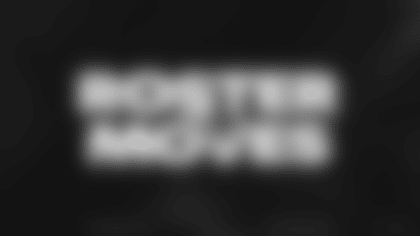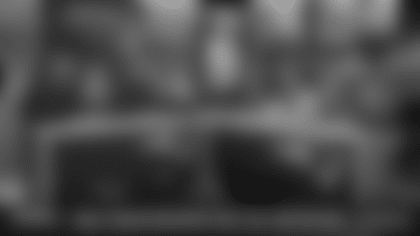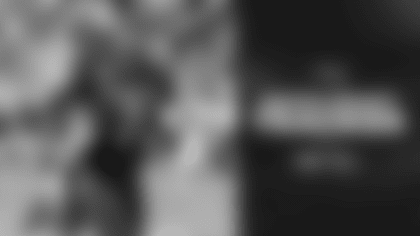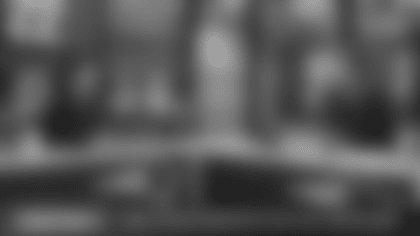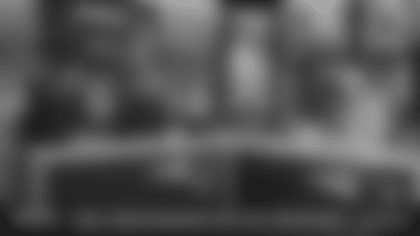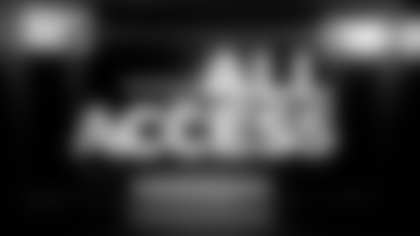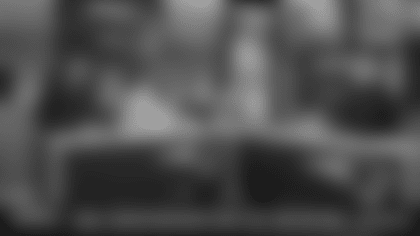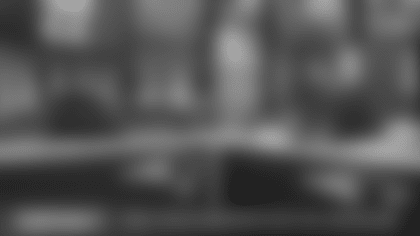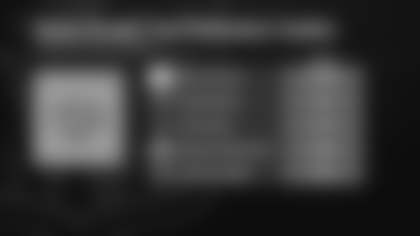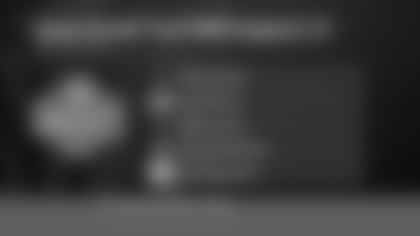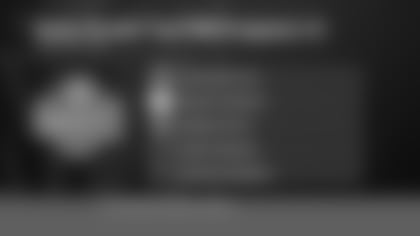HEAD COACH BILL BELICHICK
CONFERENCE CALL
October 23, 2017
[wysifield-embeddedaudio|eid="606966"|type="embeddedaudio"|view_mode="full"]
Q: What did you see from David Harris with his extended playing time last night?
BB: Well, as always, I think David works hard and is very well prepared and did all of the right things that we would want him to do from an assignment standpoint. He gave us some good plays, was in on a few plays. Again, handled the communication in the front well. We'll see if we can build on it. We've got a lot of good play from a number of guys and he's certainly part of that group.
Q: Would you put the offensive line in that category of good play as well?
BB: Yeah, I thought overall offensively we had a lot of good plays. We even had to put some plays together to drive the ball. This isn't the type of team that gives up a lot of big plays. I think they've given up the fewest in the league, so we were able to do that both in the running game and the passing game. I thought our offensive line competed well. Again, they have a good group. There was some back and forth. They gave us some problems and I think we gave them a few, but they competed. They competed right at the end. I thought the last five plays when we were able to get a couple of first downs there and run out the clock were a good exclamation point for the play of the offensive line and the running backs – Dion [Lewis]. They ground out some tough yards there. We needed those.
Q: You seemed to get solid contributions from the entire stable of running backs last night. Is that something that you have seen improve in practice over the past few weeks?
BB: Well, I think all of the players have been productive for us. It was good to get Rex [Burkhead] back and he gave us some production, as well, both in the kicking game and offensively. I feel like we have a lot of depth and quality players at that positon, really all five of them including Brandon [Bolden]. They all have the ability to help our team in a number of different ways. We'll just see how it goes going forward but we have confidence in all of those players and they were all able to contribute last night, so it was a good performance from that group.
Q: What did you see on film this morning from Tom Brady in regards to his ability to move around the pocket last night and keep plays alive to find receivers downfield?
BB: Yeah, I think Tom has good pocket presence always. Always has had a good feel in the pocket. That's one of the many qualities that make him the player that he is. It's been a little bit like that the last couple of weeks really. We were able to get everybody blocked pretty cleanly but not in the classic cup-shaped pocket and Tom had to move a little bit either up in the pocket or to the side to have some space to throw the ball. He did a good job of that and the line did a good job of creating that space for him to be able to move into.
Q: Is that something that he just does out of experience or is that something that Josh McDaniels may talk to him about on the sideline?
BB: I mean, again, a lot of that is preparation. He's watched a lot of passing plays and quarterbacks and receivers are always watching the coverage and the throwing part of the play, but the pocket is important, too. We take a look at that. Depending on what the protection is and what front there is, what front the defense is in, that creates some pass protection blocking angles and gives the quarterback an idea. If you have five blockers and they have four rushers then one side is the three-on-two side and the other side is basically the two-on-two side, more or less. Which side to favor and knowing which players like to power rush, which players like to speed rush, which players like to spin and come inside, not that the quarterback is looking at those players but if you have an awareness of tendencies that they like to do then when those things happen you kind of get the reaction to that. We try to get our players on the practice [squad] in practice to simulate the type of rushes that we'll get so that over the course of the week the blockers get a feel for, again, the type of rushes that they'll see and the quarterback gets a feel for the type of pocket that we'd likely encounter. It's all part of it.
Q: On the goal line stop by Kyle Van Noy on the end-around by Atlanta, it looked like he kind of went with the runner in motion. Is that something that you guys prepared for or is that kind of standard for his responsibility when he sees that player go in motion?
BB: Right. It's a little bit of an unusual play to run down on the goal line but we've seen it before. It's a tough play because in your goal line defense when you're trying to stop the run down there you're almost always in some type of man coverage principles. So, when the receiver – [Taylor] Gabriel – comes across in a fast motion like that it's almost impossible for the guy who has him in man coverage to get through all of the traffic and get over the top on everything and he's there on the other side. Kyle made a great play, made a very instinctive play. He recognized the motion and then saw that the defender was a little bit behind the receiver and so he moved into position to have better leverage on the play. Trey Flowers also saw that and it might have forced him a little bit deeper. Kyle might have made the play anyway but Trey got a good read on it, too, and was able to partially disrupt the play. If you can just force that play to not get around the corner immediately through a belly back and give ground or if the runner has to slow down and gather it all then you're in position to get there. That play is really dangerous if they can just hit it on the outside and then you have no way to catch them. Trey made a good play on that and Kyle's awareness and the quickness with which he got outside with all of the traffic so that he could kind of have a clear shot to come up the field was a real heads up play on his part.
Q: Kyle Van Noy's role seems to have increased more this season than last. Is that something you envisioned when acquiring him or is it just a result of him earning more time through his performance in training camp and throughout the season?
BB: Well, he saw a lot of time in training camp Phil [Perry], as you know, with the time that Dont'a [Hightower] was out, but his role increased throughout the course of the season last year. I think really at the end of the year – like call it the last month or five, six weeks of the regular season and playoffs – his playtime was very high. His production was high. We felt like going into the season that, again, Kyle is a versatile player. He's able to do a lot of things. He can really play on the end of the line. He can pass rush. He can play in coverage. He can play middle linebacker. He can play outside linebacker. He gives us a lot of flexibility on defense. Not that you want a player to have to play five or six different positons but sometimes in your scheme or over the course of the season things can shift a little bit, but we headed into the season thinking that he would certainly have a bigger role than he had last year just because the amount of time that he's had to familiarize himself with our system and practice it all through the spring and all through training camp. Kyle has been a very durable player. He's out there every day. He gets better, works hard every day. He's able to do more and he wants to do more. He's the type of player that wants more responsibility and likes the challenges of doing different things; coverage, pass rush, playing the run, playing on the line, playing off the line. His hard work has paid off in a lot of opportunity and a lot of production in a number of different areas. The one area that stands out is, of course, as you mentioned the number of plays that he's on the field for.
Q: What have you seen the last couple of games from the kick and punt coverage units?
BB: Those guys have done a pretty good job all year, all the way back to training camp, as well. We put a lot of work into that. You know, you have to be able to protect the punter, and that comes up from time to time. If you don't do a good job of it, it will come up a lot. But if you do do a good job of it, then you're in a coverage game. We just, I think this year, maybe allocated a little bit more time to individual coverage techniques, and Joe [Judge] and Bubba [Ray Ventrone] have done a real good job of improving the individual players with their leverage and technique, but also as a unit everybody working with each other and making sure that we're sound in our field coverage responsibilities. You know, the first guys down are important, guys like [Matthew] Slater, Jon Jones and guys like that. And then the next layer of coverage, kind of the lane coverages, is important to be disciplined and to maintain leverage on the ball. You know, I thought we faced a good returner last night who ran hard and had good vision, was a strong runner. And then the third layer of coverage – kind of the safety, one or two safeties, depending on what the scheme is – those guys are in position to prevent a long play, and a lot of times they end up making tackles not that long after the returner's got the ball. They can attack when inside the 25-yard line on kickoff or something like that. A lot of times it clears up for them and they're able to fit in there and make the play. You have to have good kicks, of course, but the coverage team has to be well-coordinated, and we have a lot of guys that have experience that are working together. Some of the players that don't have as much experience on our team, even though they have experience in the league – guys like [Marquis] Flowers and [Cassius] Marsh that have been a big factor for us in the kicking game – they've worked in well with their other players.
Q: How much, if it all, did the fog affect the coaching staff when trying to review the game film this morning?
BB: Well, it affected us a lot this morning because it's hard to see the game. The fourth quarter is – I don't know – pretty close to a white-out on the sideline film. The sideline cameras are at the top of the stadium, so that's a tough shot. The end zone cameras are a little bit lower and they get a little tighter shot, so the picture is a little bit clearer. But, on that shot, a lot of times you're not able to see all the guys on the perimeter. It's kind of an in-line shot. Yeah, the first half, start of the third quarter, it's alright. As they get into the middle of the third quarter and on, for those of us with aging eyes, it's a little strained to see it, and then there's a point where you can't really see it at all, especially from the sideline. So, yeah, it affected us. I didn't think it really affected us that much during the game. I mean, it wasn't a clear day. I'm not saying that, but in terms of doing anything different, I thought the receivers were able to catch the ball, the returners were able to handle the punts and the kickoffs. It might have made it a little bit more difficult, but they were able to do it without a lot of problems. So, it was more, I'd say, just tougher for, whether it be our video camera or the fans that were sitting in the upper deck. It's just there was too much interference there. It was probably hard to see the game. I know when we tried to look at the pictures in between series – you know, I don't look at the tablets, so I won't get into that – but the pictures, it was kind of the same thing. It was hard to really be able to make out exactly what you were seeing.
Q: This week was probably different for Johnson Bademosi knowing early on he would play a significant role in the game. How did he respond to the full week of preparation?
BB: Right, it was a totally different week for him this week in that respect. But, J.B. does a good job. He prepares hard every week and he's ready to go whatever his role is, whether it be on special teams or a unit on defense or last week it was a starting role on defense. But, he's very professional. He's smart and he takes his job seriously and really has a good work ethic and goes through all the steps and preparation that he can to prepare himself for the game, whatever that role happens to be. So, he's done a good job of that for us.
Q: You brought in Johnson and Marsh right before the season started. How did you get each guy and why did you bring them here? Specifically, what did each of them offer that interested in you?
BB: Well, both of those players we had an interest in and had interaction with. Cassius, when he came out in the draft three years ago, it was a guy we spent quite a bit of time with, and we just weren't able to get him quick enough. Seattle had quite a bit of depth at that defensive end position in the last couple years, and so we've kind of kept an eye on that and talked to them. So, this time it was able to work out. We had some, with Rob Ninkovich retiring, Derek [Rivers] getting injured in Houston -- you know, we lost a little bit of depth at that position. Hightower, at that point, wasn't practicing, not that he's a full-time end, but he was part of the equation, too. I mean, you know, I'd just say it kind of worked out for us. Same thing with Bademosi. We had looked at him in free agency two years ago, and he signed with Detroit. Bob [Quinn] signed him. Bob liked him here. We went through the whole free agency process there in the season, and Bademosi was probably one of our top-ranked guys for the roles that we projected him in. Then Bob went to Detroit and he ended up signing him there. I'd say that wasn't really a surprise to us because we knew that he liked the player. I mean, we all liked him. That's the way things worked out. After we went up to Detroit and talked to Bob, they had some young players, had quite a bit of depth at that position, so we were able to work things out there. So, basically that's it.
Q: On Cooks' touchdown, why did the play involve more of a drop from Brady to Cooks instead of the traditional hand off? What did you think of the way he followed Gronkowski to get into the end zone?
BB: I thought he did a good job of using the blocking. A lot of times, runners sometimes get impatient with the blocking and they feel like the blockers aren't going fast enough and they want to run past them, but they usually end up just running into defenders. I mean, sometimes they don't want to slow down because they don't want to get caught from behind, but you know, they just want to go and gain yardage. I thought Cooks had a good awareness of where he was. He was already outside of everything. There wasn't really anybody behind him, so he had good patience, let the blocks develop and then Rob kind of pushed [Robert] Alford out of bounds there and he was able to cut it up inside and get into the end zone. Ball handling -- I mean, it could have been a hand off. We've seen that plenty of times. We've done that ourselves, so we felt like that was the best way for us to run that play, but it certainly -- there's a couple different ways we could have done the ball handling. We just ended up doing it that way.
Q: Cooks grabbed Gronkowski's jersey when following him into the end zone. Is that a good technique to use in situations like that?
BB: Well, you know, again, I think you see that with running backs and pulling guards and screen passes, things like that, where you have a blocker in front of a runner and the runner is usually faster than the blockers. So, you don't want to get too close to the guy in front in of you because, when there's contact, then you're just running into his back, so you want to leave enough space so that you can cut off the block. But, at the same time, you want to be moving at about the same pace as the blockers are moving. But, again, sometimes the runners get a little bit impatient on that and want to push the blocker ahead or let him know that he's right behind him and kind of encourage him to go a little bit faster. But, the runner's got the ball, he wants to make yards, he doesn't want to stand there and get tackled, and the blocker doesn't know exactly where the runner is behind him. So, the best thing the blocker can do is just keep going because the tacklers will come to him when they have that kind of relationship. The tacklers will come to the runner, but they'll come to the blocker, too. Really, the key to that is just for everybody to keep running. The tacklers will come. We don't really have to go find them. They'll come to us because of the proximity to the running back.


